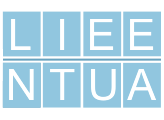Economic and Strategic Analysis of Industry, Innovation and Technology
In this field, the Laboratory of Industrial & and Energy Economics (LIEE) carries out research pertaining to the economic analysis and the exploration of socio-economic and development effects of technology and innovation with key focus on the analysis of business strategies and the related public policies at the national and European level. More specifically, the group has been involved in research pertaining to research cooperations, knowledge flows and the emergence of knowledge based economies. Specific attention is paid to the creation of new sectors of economic and technological activities as a result of the combination of the knowhow of various industrial sectors with the innovation systems. In addition, LIEE has been involved in research devoted to the connection of the macro-economic and technological policy, the networking of research and business cooperation, the knowledge based enterpreneuship and the dymamic capabilities of the businesses. Finally, it is worth noticing that this group has a remarkable participation in EU’s competitive projects related to Socio – Economic Research.
Energy and Environmental Economics and Policy
The Laboratory of Industrial and Energy Economics (LIEE) is active in the field of Energy and Environmental Economics and Policy since the early 90’s, when energy was widely recognized as the key factor influencing both, economic growth and environmental quality. Thus, research activities in this area focus on the analysis of the relationships between Energy, Economy and Environment. More specifically, the group is involved in research pertaining to the promotion of innovative and environmental friendly technologies, namely of Renewable Energy Resources (RES) and Energy Saving measures. Towards this direction, research activities concentrate on energy planning, the assessment of energy externalities and the formulation of supporting policies for energy and environment. In parallel, LIEE is developing and implementing methods and tools for analysis, evaluation and decision aid, taking into account the presence of multiple and competing criteria in energy decisions (Multi – Criteria Analysis), the distortions and inefficiencies of the markets, (Welfare Economics, Cost-Benefit Analysis), the conflicts of stakeholders’ positions (Group Decision Making) and the uncertainties of objective parameters and subjective preferences (Stochastic Analysis, Fuzzy Set Theory).
Operations Research and Management Science
The development of this scientific area reflects the need to systematically support the decision making process in enterprises, organizations and policy centers, in a rapidly changing economic, technological and physical environment. The Laboratory of Industrial and Energy Economics (LIEE) is engaged in the development of methods and models for system optimization and decision aid that ensure:
- Broadening of the system’s boundaries and of the evaluation perspectives, so as to take into account a wider range of impacts.
- Synthesis of multiple contradictory aspects and of the possibly conflicting views of all those involved in the decision making process.
- Management of the uncertainty inherent in the systems’ structural and operational characteristics, in the external variables and in the decision makers’ preferences.
Information Society and Knowledge-based economy
INFOSTRAG is a interdisciplinary group that focuses on the Strategic, Economic and Technological Analysis of the Information Society and the Knowledge-based Economy (local e-government, e-business, development strategies for the Information Society and strategic direction of the implementation of major programs). Since 2004 the research group supports scientifically KEDKE for the design and the implementation of a strategy for the operational use of information and communications technologies by municipalities and to formulate a “road map” for the digital municipality. The research team organizes a permanent research seminar on issues related to the Information Society and Knowledge Economy.
